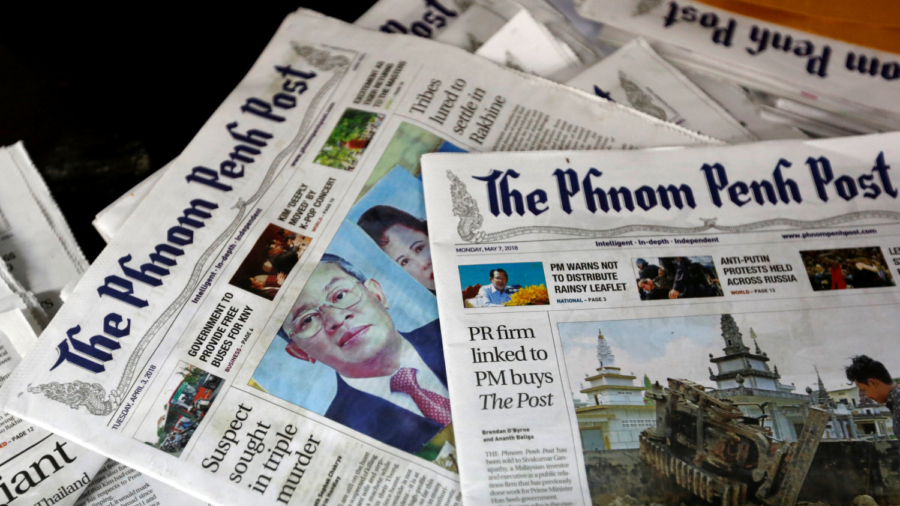BANGKOK—The purchase of the Phnom Penh Post by a Malaysian investor, whose public relations firm lists Cambodia’s long-serving Prime Minister Hun Sen as a client, is a “disaster” for media freedom ahead of a general election, an international rights group said on Monday.
In power for 33 years, Hun Sen and his allies have cracked down on perceived critics, opposition politicians, independent media, and human rights groups ahead of the July 29 vote.
The English-language daily, founded in 1992, has built a reputation for independent reporting that can be critical of the government on issues such as illegal logging and corruption. Its sale was announced on Saturday by Australian businessman Bill Clough, who had owned the newspaper since 2008.
On Monday, the newspaper’s editor-in-chief said he was fired for allowing the publication of an article about the sale, while several staff members said on social media that they had quit.
The new owner, Sivakumar Ganapathy, criticised the report as “a disgrace” and said three members of staff, including the editor-in-chief, had been fired over it.
Ganapathy is managing director of Asia Public Relations Consultants Sdn Bhd, headquartered in Kuala Lumpur.
The PR firm’s website referred to “Cambodia and Hun Sen’s entry into the Government seat” as one of its projects. It also described Ganapathy as leading a team managing “covert operations” for its clients. It did not elaborate.
Phil Robertson, deputy Asia director of Human Rights Watch, said the deal was a “disaster for media freedom,” telling Reuters that “the only plausible rationale for this acquisition is to blunt the Post’s critical coverage of the government.”
Reuters called Asia PR’s headquarters seeking comment, and was told that Ganapathy was not available. His assistant, Krishna Kumaar, said Ganapathy was expected to return in two weeks.
But in a statement seen by Reuters later on Monday, Ganapathy denounced the report about the sale as bordering on “internal sabotage” and “extremely damaging to the guiding principle of the purchase and takeover of the Phnom Penh Post.”
He said the editor-in-chief, Kay Kimsong, and two other staff members had been fired over it.
Firings, Resignations, Protests
Earlier, Kay Kimsong told Reuters he had been fired because he had allowed the report to be published.
Four other staff members said on Twitter they had resigned including Brendan O’Byrne, who Ganapathy said had been fired.
O’Byrne said the new management had ordered him to remove the online version of the Sunday report about the sale.
“I refused and offered my resignation, which was accepted,” O’Byrne wrote on Twitter.
Several sources at the newspaper said there was a brief protest at its offices on Monday over the editor-in-chief’s firing.
Huy Vannak, undersecretary of state at the Interior Ministry, told Reuters the government welcomed “all investors” to Cambodia. He did not specifically address links between the newspaper’s new owner and the government.
About 30 radio stations were shut last year and the Cambodia Daily, a long-time English-language rival of the Phnom Penh Post, shut down after it was ordered to pay millions of dollars in back taxes by the government or face closure.
The media blossomed in Cambodia with the arrival of a U.N. mission in the early 1990s to oversee efforts to build democracy after decades of war, genocide, and isolation at the hands of the Cambodian (Khmer) communists (
But hopes of sustaining a free media have dimmed in recent years as the government has grown more intolerant of dissent.
In a 2018 press freedom index, published by Reporters Without Borders, Cambodia dropped 10 places from 132 to 142.
The Phnom Penh Post was reportedly slapped with a $5 million tax bill last year, according to reports by the Australian Broadcasting Corporation.
In a statement on Saturday, former owner Clough said the tax issue had been resolved, and that the sale was prompted by a “worldwide decline in market share for newspaper advertising,” which had also been felt in Cambodia.
By Amy Sawitta Lefevre


